Coronavirus (COVID-19) Updates
For the latest COVID-19 information and updates from Qatar Foundation, please visit our Statements page

Kerby Gilstrap, an American student, writes about her Arabic learning journey and how it was impacted by the pandemic
Economy, travel, business, sport and several other, if not all, aspects of life have been and continue to be affected by the pandemic. One area that is deeply affected by it, but is often overlooked, is language learning, particularly for non-native speakers.
As they say, learning a new language is the same as training a muscle, use it or lose it! Not being able to use it meant I was, sadly, losing it. Or that’s what I thought until QatarDebate came to the rescue of my slowly fading Arabic language skills and breathed new life into them.
In my case, I am a 22-year-old American, who embarked on my Arabic language journey three years ago. It was going well until January 2020, and as the pandemic worsened, I found my learning journey slowed down considerably and at times even halted. As they say, learning a new language is the same as training a muscle, use it or lose it! Not being able to use it meant I was, sadly, losing it. Or that’s what I thought until QatarDebate came to the rescue of my slowly fading Arabic language skills and breathed new life into them.
Let me first tell you a bit about how and why I decided to learn Arabic.
I grew up in Bowling Green, an agricultural city in southern Kentucky with a predominately white and Christian population. In the first sixteen years of my life, I only knowingly met one Muslim. Yes, really!
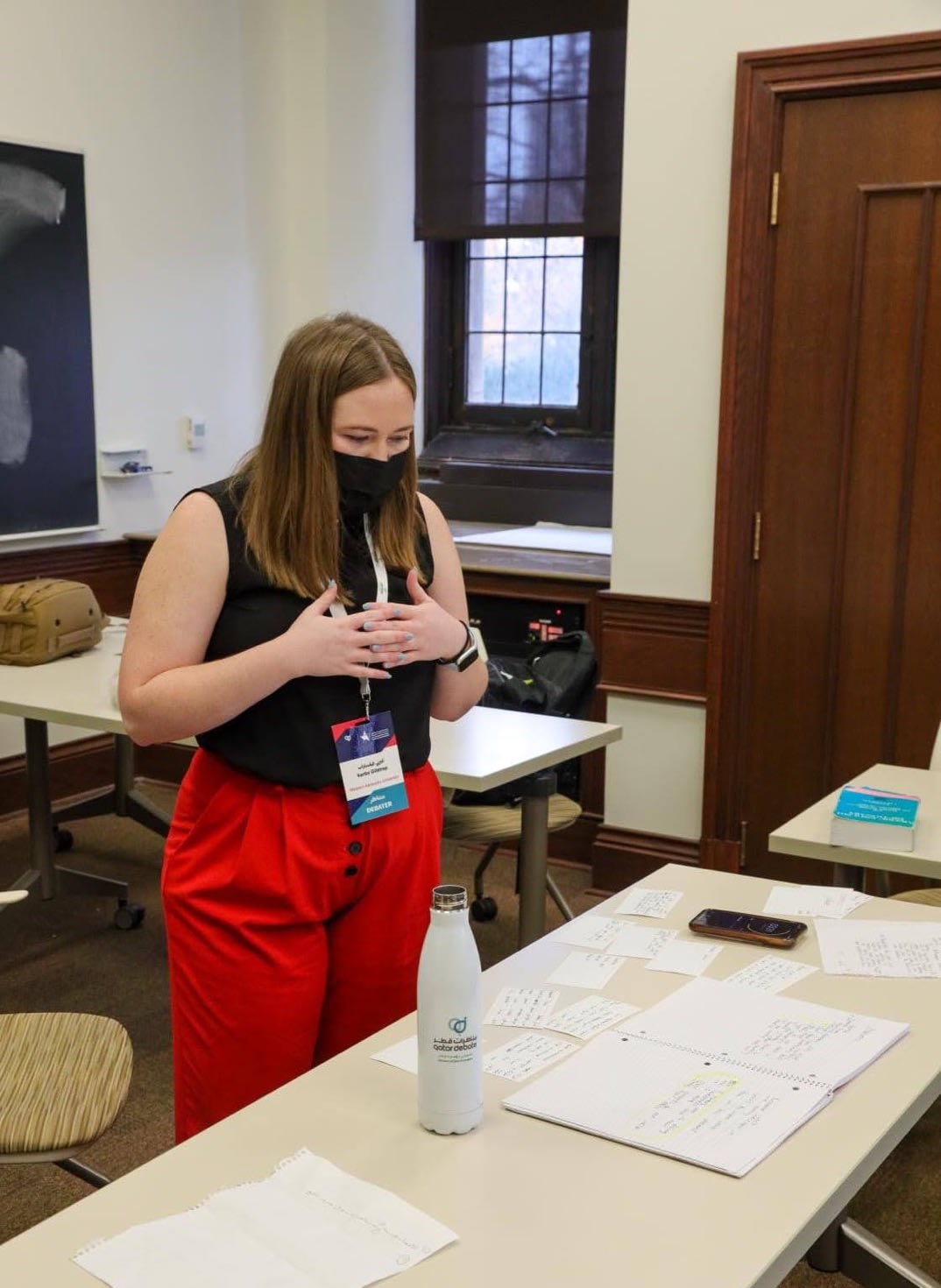
Kerby Gilstrap
The point I am trying to make is that I had zero connection to the Muslim or Arab world – no friends, no family, never visited the region. I hadn’t even heard much about it, except for a few times on the news. And then heard some more when Donald Trump ran for president.
I was a sophomore in high school back then and I remember hearing his Islamophobic statements on the campaign trail and thinking this isn’t right, and there is no way these things can be true. I think what bothered me the most was how an entire race was being painted with the same brush.
A strong desire to learn more about the Arab culture and form my own opinions instead of blindly believing what I was being told is what led me to begin studying Arabic at Western Kentucky University in August 2018.
A strong desire to learn more about the Arab culture and form my own opinions instead of blindly believing what I was being told is what led me to begin studying Arabic at Western Kentucky University in August 2018.
My interest in studying Arabic was not received positively by family and friends. I remember my grandfather being particularly vocal about it, often questioning why I would want to study the Arabic language or the culture. He could not see what I was starting to see, which were the similarities between our cultures.
Despite my interest in the language, I quickly realized it was not an easy language to learn. In fact, I would say Arabic is one of the hardest languages for English speakers to learn. The bit I struggled most with was the pronunciation of letters that are unique to Arabic.
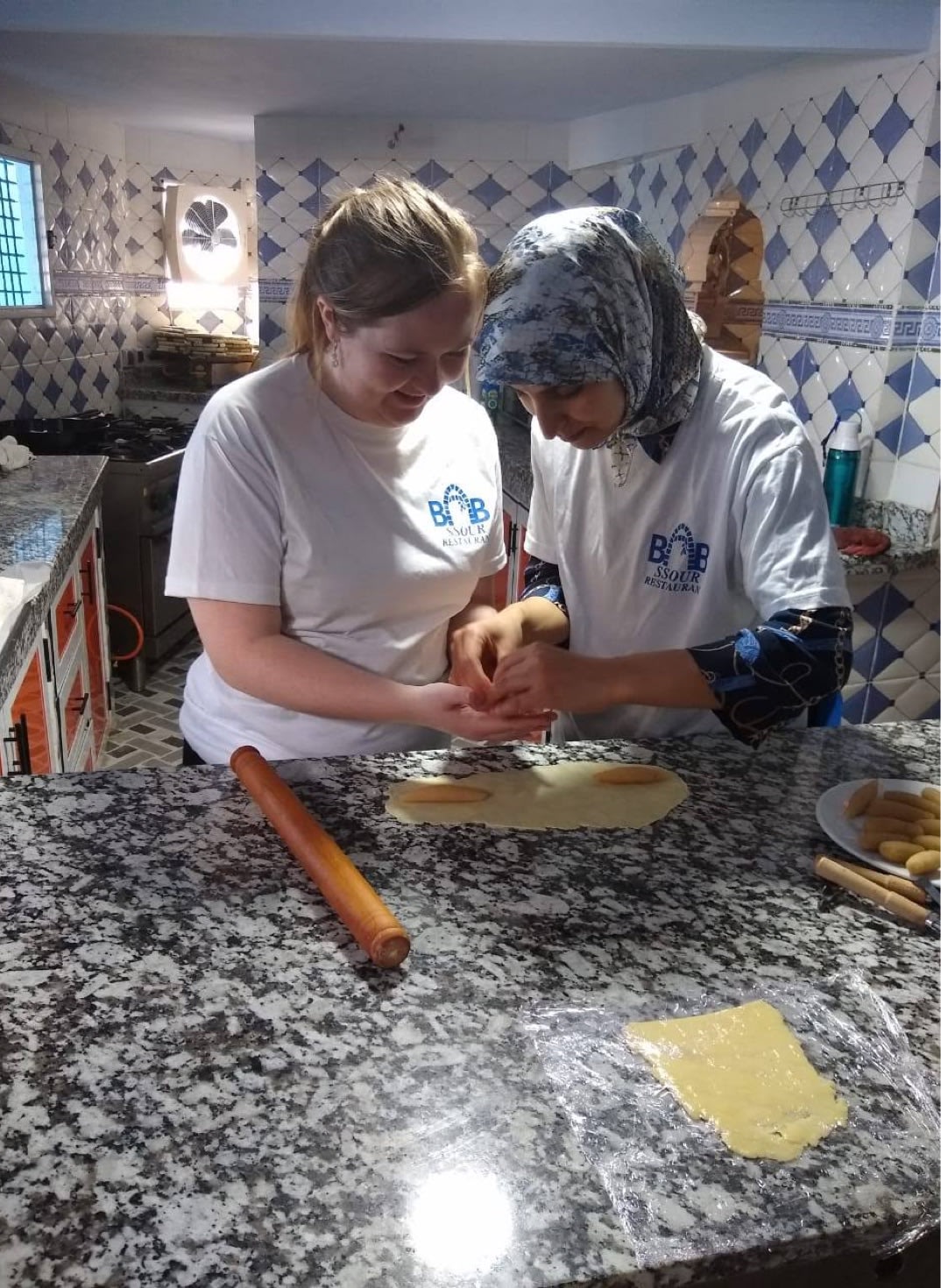
Gilstrap attending a cooking class during her time in Morocco
I traveled to Morocco in summer 2019 for a study abroad program which was great for my Arabic skills, particularly for my pronunciation. After returning from Morocco, I did not study Arabic formally for quite a while, and of course the opportunities for casual Arabic conversations were far and few. And then came the pandemic, which only made matters worse.
Like many others, my Arabic learning journey was severely hindered due to the pandemic. I think language learning is one of those skills that demand an immersive environment. I could only learn so much from reading, and not being able to speak the language in an interactive environment was quite frustrating as a student. The student in me was craving the immersive nature of my study abroad experience but with the travel restrictions still in place, I knew that wasn’t possible.
Imagine my surprise and delight when I received an email from QatarDebate in August 2021 announcing its 2nd US Universities Arabic Debating Championship (USADC). I ran to my Arabic professor and coach to tell him the good news; I knew this was just the opportunity myself and other students needed to reinvigorate our passion and skills for the Arabic language.
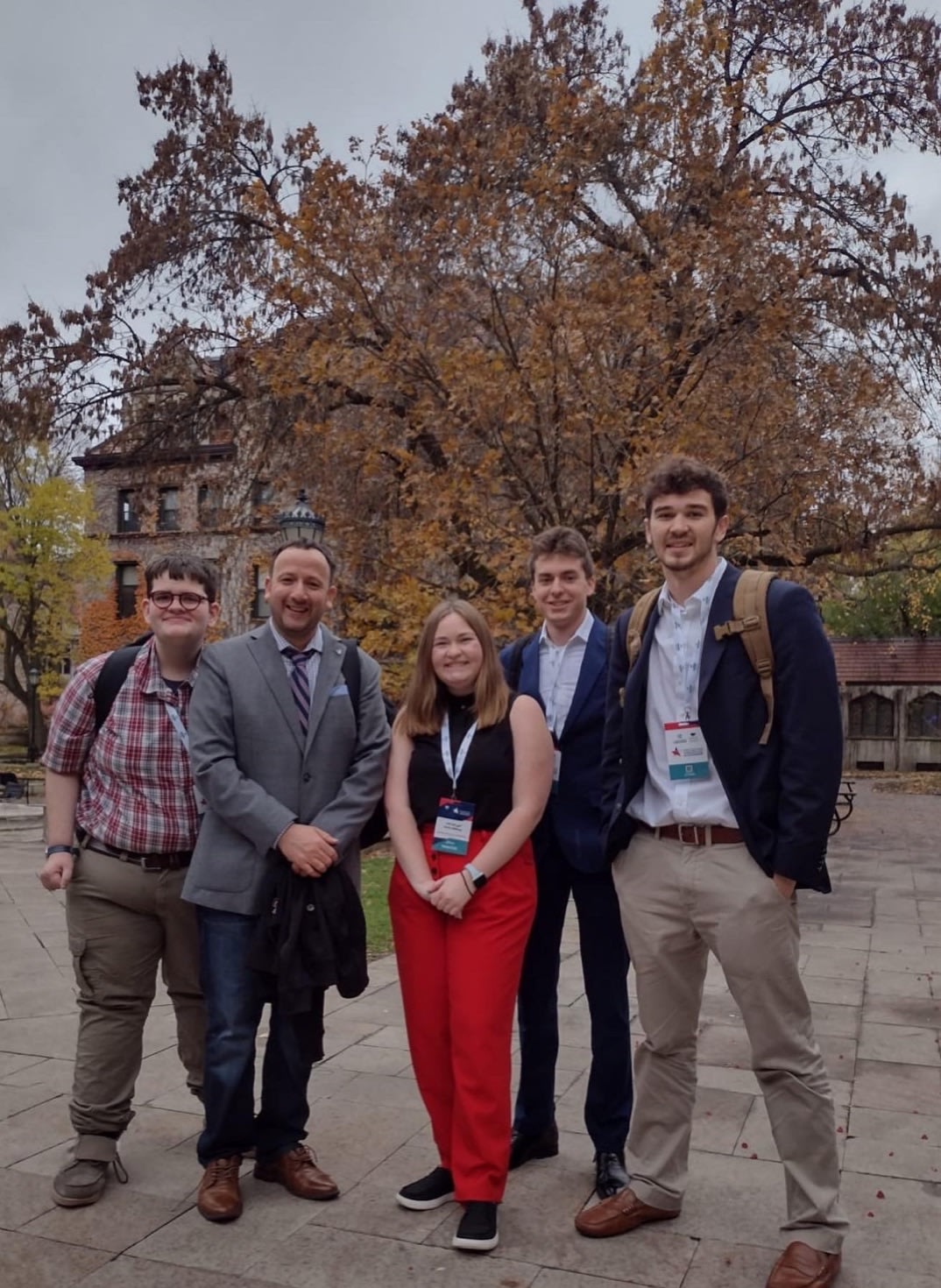
Gilstrap (center) with her team at the second US Universities Arabic Debating Championship
Finally, in fall of this year, I had an in-person Arabic class again as well as additional weekly training for Arabic debate, and I quickly found my Arabic was improving.
As prepared as I thought I was for the 2nd USADC, I have to say it tested my skills beyond what I thought imaginable. I compare it to the same experience as studying abroad. When studying abroad in a country where English is not the dominant language, students can either persevere and keep struggling to understand, or they can close their minds and reject the frustrating feeling of not understanding. The latter does not result in language acquisition, and instead, prevents us from building our skills.
USADC provided a similar high-impact experience for me. From the moment training began, everything was in Arabic. At first, I was taken aback; I hadn’t experienced so much immersion in Arabic since studying in Morocco, but my brain quickly caught on. It was an incredibly validating experience because ever since COVID-19, I had felt very insecure about my diminished language skills. By debate day, my brain was primed to understand and translate Arabic.
My speaking skills were also put to the test at USADC. And while I know that my grammar needs work, I was impressed with the level of vocabulary I could use. Speaking about global challenges and advocating for powerful solutions in Arabic was an incredible gift to me and my teammates.
It isn’t just my command over the Arabic language that is improving, it is also sentiments towards Arabs among my close family members that are improving, and I am not sure which of the two makes me happier.
It isn’t just my command over the Arabic language that is improving, it is also sentiments towards Arabs among my close family members that are improving, and I am not sure which of the two makes me happier.
Last month while helping my grandfather cook for our family Thanksgiving dinner, he asked me about my time at the USADC. He wanted to know how well our team did, and where the students who participated were from. He had never shown positive interest or support towards my decision to study Arabic until this past holiday. Through my exposure and experiences, he has become more tolerant, and seems to be excited for the opportunities it is providing me.
QatarDebate’s work does not just impact American students who are studying the language, but it is also positively exposing our family and friends to the Middle East.
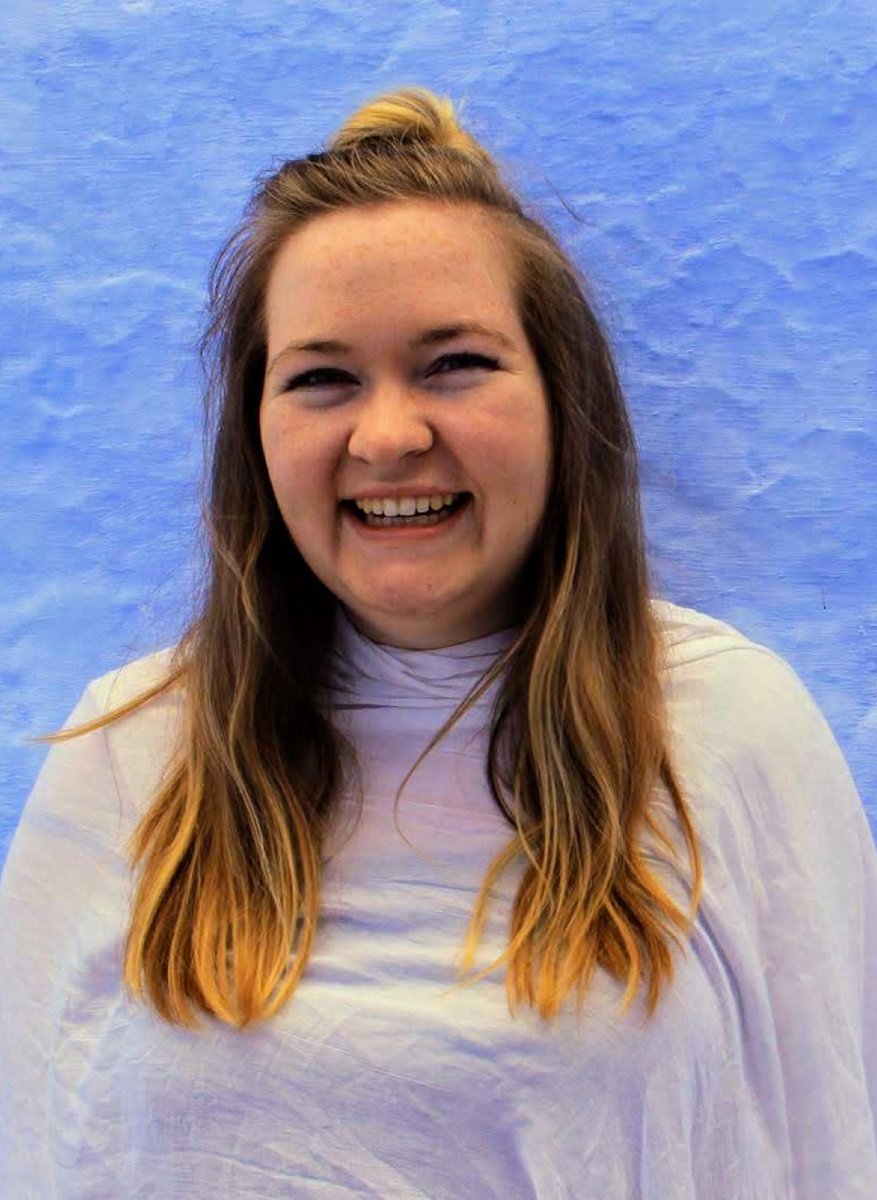
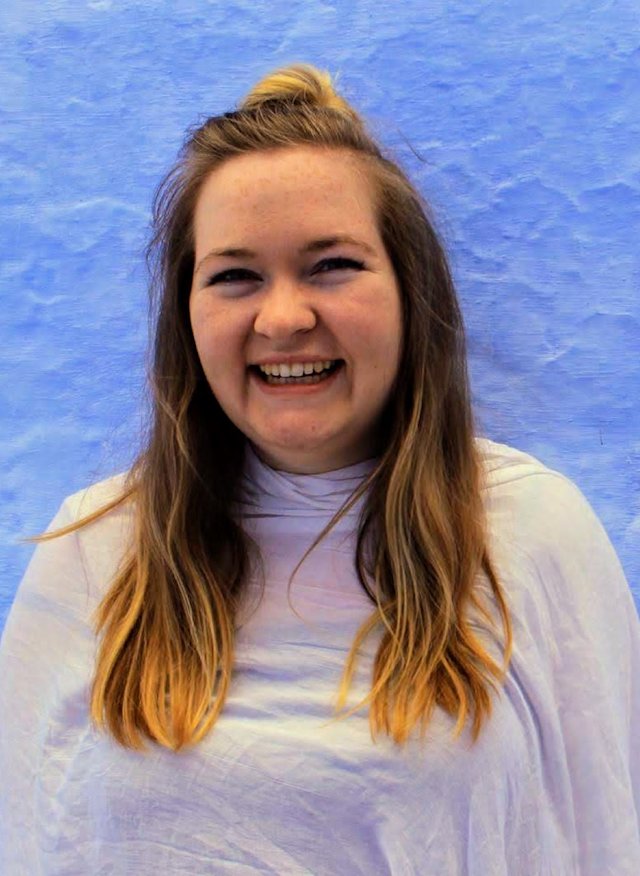
I am graduating this spring, and while I do not know exactly what is next for me, one thing I am sure of is that the Arabic language is the common denominator of each opportunity that I will pursue.
I am graduating this spring, and while I do not know exactly what is next for me, one thing I am sure of is that the Arabic language is the common denominator of each opportunity that I will pursue.

